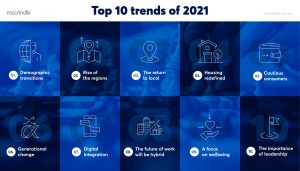By: McCrindle
2020 was a year unlike any other. Our year in review showed the vast changes and important social, political, global and cultural events that took place. As we look ahead to 2021, it’s important for leaders to have foresight, and to be able to see things not just as they are, but as they will be. So, what can we expect to see and change in the year ahead?
Here are the top 10 trends from our Strategic Insights for 2021 virtual event.

1. Demographic transitions
After a couple of centuries of population growth, in 2021 we will continue to see a rapid slow of population growth. Closed international borders have halted the growth from migration – which has been the biggest source of our population growth in recent years. This is coinciding with Australia’s lowest recorded birth rate, meaning Australia is predicted to have 1 million people less in a decade’s time than predictions indicate prior to COVID-19.
2. Rise of the regions
Just 10% of Australians live in regional areas outside our capitals and regional cities. However, the de-coupling of work and the workplace location has given rise to people’s interest in the appeal of regional areas. This signifies a shift away from the capital-city-centric nation Australia has been. Regions have always had lifestyle advantages and now they have employment benefits too.
3. The return to local
With more time spent at home, and less people commuting into the cities everyday for work, we will increasingly see people stay within their local community for services and entertainment. In 2021, geographical communities will become the local community.
4. Housing redefined
Our research has shown that half of Australians are planning to look for a new home to rent or buy in the next two years that incorporates more of what they value. This is more common among people living in apartments and among those who worked from home in 2020, showing COVID-19 to be the catalyst for this shift. As homes continue to facilitate different purposes, we can expect to see an increase in the need for more indoor/outdoor space, less common areas and homes with a study.
5. Cautious consumers
In these volatile economic times, consumer confidence is low, people are looking for value and are assessing their purchases. Two in five Australians (41%) said they managed to save more money than usual in 2020. Uncertainties around employment and the realities of a recession will mean people will continue to build their savings and pay off debt, as opposed to spending.
6. Generational change
Generations do not change over time to look identical to how their parents looked at the same age. Rather, a generation is a product of their current age, their times, and importantly the formative technologies and social markers that uniquely shaped them. As more generations mix in our societies, families, communities, and workplaces, it will be more important than ever to gain insight into their defining characteristics and expectations and respond appropriately.
7. Digital integration
2021 will continue to be a time of constant change, where technology develops faster than ever before and shapes consumption habits in ways previous generations have not experienced. In a COVID-19 environment, organisations will need to adapt to change in mere weeks instead of years, to keep up with consumer demand for simplicity, personalisation and customisation as a result of increasing digital integration.
8. The future of work will be hybrid
In 2020 we saw the biggest transformation to work occur in a century, with working from home becoming the new normal. The future of work will be hybrid, with three in five Australians (62%) looking for a mix of working from home and in the workplace. This hybrid approach shows that the aspects of workplace culture and community which are missed when working solely from home are still able to be met when employees meet in the workplace to collaborate.
9. A focus on wellbeing
After a decade of digital disruption, screen saturation, 24/7 expectations and always-on technologies, Australians were struggling to find a sustainable pace of life. Then came COVID-19 and the resulting lockdowns. While the pandemic brought anxiety, health concerns and financial impacts, it also provided an opportunity for Australians to rebalance their lives. In 2021, Australians will look for ways to maintain a slower pace of life, greater work/life integration, time savings and a focus on their wellbeing.
10. The importance of leadership
Leaders are key to shaping culture, as people look to them for what behaviour, customs, attitudes and ways of communicating are favourable and acceptable in an environment. As COVID-19 continues to create uncertainty about job security, physical and mental health, leaders need to step up and lead by being completely open and honest with sharing information, making tough calls early and backing themselves, as well as leading with confidence as well as empathy and vision.
Article supplied with thanks to McCrindle.
About the Author: McCrindle are a team of researchers and communications specialists who discover insights, and tell the story of Australians – what we do, and who we are.
Feature image: Photo by JESHOOTS.COM on Unsplash





